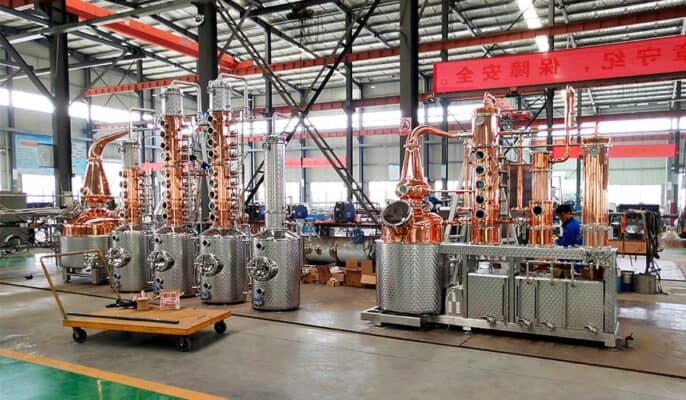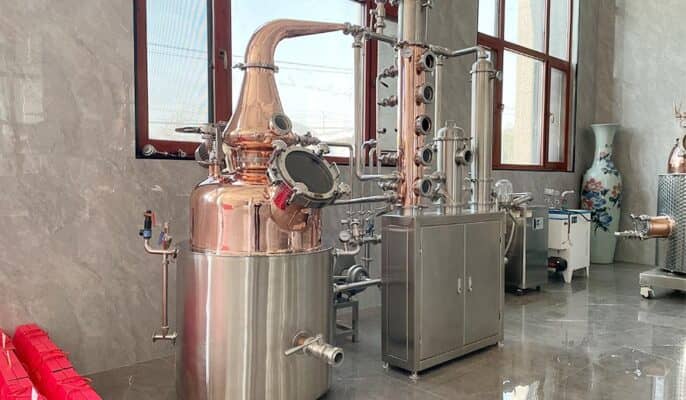Alcohol is not produced by distillation, which is the process of separating alcohol from other components in a liquid mixture to create a unique flavor. You need to distill alcohol starting from an alcoholic liquid. Most vodka and whiskey are distilled from beer, which is made by fermenting grains.
What is distilled liquor?
Distillation begins with a fermented liquid, such as mash or liquid alcohol such as wine, which is heated in a still. As the liquid heats, the alcohol evaporates and rises to the top of the still, where it is collected and concentrated into a concentrated solution. The solution can be further purified through a distillation process to produce a concentrated alcohol such as vodka or whiskey.
During the wine distillation process, more than ethanol is extracted. Other elements also enter the distillate: aromatic compounds, volatile acids and homologues. They determine the aroma, flavor and mouthfeel of the final product.
The process of making spirits involves adding natural or artificial flavors to the distilled alcohol. This can include adding fruits, herbs or spices to the alcohol, or adding artificial flavors to create a specific taste. The alcohol is then aged in barrels or bottles, allowing the flavors to meld together into the finished product. While there are some similarities between distilling and making spirits, they are different processes that must different skills and equipment.

Ethanol in wine
Alcohol can be made from a variety of crop products in three basic steps:
- break down raw materials through a process that may involve cooking and adding enzymes.
- Fermentation, the action of microorganisms (usually yeast) that produce “beer.” Contains small amounts of alcohol, as well as remnants of raw materials, yeast cells, and various other substances dissolved in water.
- Alcohol is separated from the water and other components in beer, usually by distillation, to get alcohol that is pure enough to be used as fuel.
Fermenting grains produces an alcohol concentration of approximately 5-10%. The final strength or “beer” depends on the amount of water used, the grain and the quality of the fermentation. The alcohol content of this beer was too low to be used as fuel and had to be further concentrated to get a mixture that could ignite and burn. So, distillation equipment is used to produce higher concentrations of alcohol.
Fermented distilled alcohol
Fermentation is a complex biochemical process involving the breakdown of sugars through the action of cultured yeast. This process is used to produce various carbonated alcoholic beverages. A variety of sugar-rich foods can be used for fermentation, such as grapes, berries, rice, potatoes, and wheat.
During fermentation, yeast consumes all available sugars, breaking them down into energy and producing ethanol as a by-product. This process continues until the alcohol content reaches 15% to 17% ABV, at which point the yeast can no longer survive. This is why most alcoholic beverages have an alcohol content of around 15%.
How to distill alcohol?
Distillation is a method of separating components or compounds from a liquid using the processes of boiling and condensation. For a successful separation, each element must have a different boiling point. The more complex the distillation process, the closer the boiling points of the components in the liquid are.
Growing, harvesting and processing of raw materials
Whether it’s grapes, grains, agave or something else, most distillates start with produce. The raw materials are grown and harvested, some by hand and some by mechanical means, and then transported to the winery.

Add yeast to start fermentation
While some raw materials (fruit, sugar cane, agave) contain sugar, others (such as grains) first must starch to be converted into fermentable sugars. This is achieved by cooking the grains in hot water containing enzymes. In whiskey and beer brewing, this process is called mashing, and the resulting liquid is called wort.
It is then transferred to the fermenter and yeast is introduced. Fermentation usually lasts three to five days, although some stills take as long as seven to nine days.
Distillation converts liquid into alcohol
The distillation process heats a fermented liquid to its boiling point, traps the vapor in the boiling liquid, and then condenses it back into a liquid as it cools. The first and most volatile compounds evaporate first. Next comes the ideal flavor compounds. The last still is the last. The tails are separated and discarded or re-distilled.
Spirits are brewed using two types of distillation equipment. Pot stills have a round body like a kettle, often made of copper, and generally produce stronger, more flavorful spirits. Column stills have tall, thin chambers that resemble columns, can be made of copper or stainless steel, and are known for producing a lighter style of distillate.
Mix
Except for single barrel products, most producers blend their distillates together to maintain consistency. The process also adds flavor and complexity. For example, a whiskey producer might blend different liquids from different barrels together to produce a whiskey that is spicier or sweeter.
Filter
Before bottling, the spirit is filtered to remove particles large and small. This may include a simple metal screen, used to remove charcoal flakes when whiskey is poured from the barrel, or carbon (charcoal) filtration, which removes color, flavor and impurities, a technique used in many spirits .
Final adjustments
Spiced rums, flavored whiskeys and other spirits, as well as liqueurs and other sweet spirits also start with spirits and are then infused or mixed with other ingredients. No matter what technique you use, create a delightful pouring experience.
Distillation type
The still is made of copper. Stills are sometimes made of copper, sometimes of stainless steel, and sometimes of a mixture. You may find stainless steel stills with copper elements inside. Copper removes most of the sulfur from the distillate. Sulfur is produced during fermentation. It can impart a sour flavor to the spirit, so it’s best to remove it.
Fractionation
This is a method of removing different compounds from a combination by distilling the same liquid many times at higher temperatures.
Steam distillation
Used to extract temperature-sensitive chemicals that may break down if extracted using a higher boiling point procedure.
Vacuum distillation
Some substances have very high boiling points. In some cases it may be helpful to reduce the pressure above the material in the column, thereby allowing the lower vapor pressure components of the combination to evaporate.




